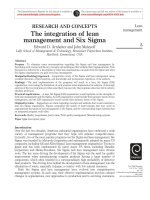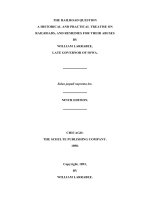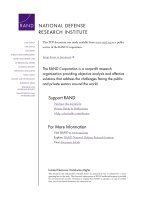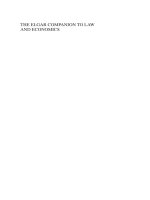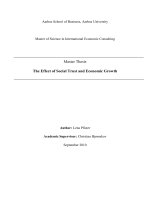quiet mind, fearless heart the taoist path through stress and spirituality
Bạn đang xem bản rút gọn của tài liệu. Xem và tải ngay bản đầy đủ của tài liệu tại đây (3.27 MB, 254 trang )
TeAm YYePG
Digitally signed by TeAm YYePG
DN: cn=TeAm YYePG, c=US, o=TeAm YYePG,
ou=TeAm YYePG, email=
Reason: I attest to the accuracy and integrity of this
document
Date: 2005.05.27 15:07:56 +08'00'
Quiet Mind,
Fearless Heart
ffirs.qxd 8/26/04 1:15 PM Page i
Also by Brian Luke Seaward, Ph.D.
Hot Stones and Funny Bones: Teens Helping Teens Coping with Stress
and Anger
Health of the Human Spirit; Spiritual Dimension for Personal Health
The Art of Calm: Relaxation through the Five Senses
Stressed Is Desserts Spelled Backward: Rising above Life’s Challenges with
Humor, Hope, and Courage
Stand Like Mountain, Flow Like Water: Reflections on Stress and
Human Spirituality
Health and Wellness Journal Workbook (second edition)
Managing Stress: A Creative Journal (third edition)
Managing Stress: Principles and Strategies for Health and Well-being
(fourth edition)
ffirs.qxd 8/26/04 1:15 PM Page ii
Quiet Mind,
Fearless Heart
The Taoist Path
through
Stress and Spirituality
BRIAN LUKE SEAWARD, Ph.D.
John Wiley & Sons, Inc.
ffirs.qxd 8/26/04 1:15 PM Page iii
C
opyright © 2005 by Brian Luke Seaward, Ph.D. All rights reserved
Published by John Wiley & Sons, Inc., Hoboken, New Jersey
Published simultaneously in Canada
The author gratefully acknowledges the following for permission to quote from: page
34, If Life Is a Game, These Are the Rules: Ten Rules for Being Human by Dr. Chérie
Carter-Scott, Broadway Books, © 1998; page 91, translation from Tao Te Ching cour-
tesy of Josh Zhou; page 117, “Stand Like Mountain, Flow Like Water” by Brian Luke
Seaward, © Health Communications Inc. Reprinted with permission; page 165,
“Beauty Poem” from In One Era and Out the Other by Samuel Levenson. Reprinted
by permission of SLL/Sterling Lord Literistic, Inc. Copyright 1996 by Samuel Lev-
enson; page 226, “The Winds of Grace” by Brian Luke Seaward, © Inspiration Unlim-
ited. Reprinted with permission. All rights reserved.
No part of this publication may be reproduced, stored in a retrieval system, or trans-
mitted in any form or by any means, electronic, mechanical, photocopying, record-
ing, scanning, or otherwise, except as permitted under Section 107 or 108 of the 1976
United States Copyright Act, without either the prior written permission of the Pub-
lisher, or authorization through payment of the appropriate per-copy fee to the Copy-
right Clearance Center, 222 Rosewood Drive, Danvers, MA 01923, (978) 750-8400,
fax (978) 646-8600, or on the web at www.copyright.com. Requests to the Publisher
for permission should be addressed to the Permissions Department, John Wiley &
Sons, Inc., 111 River Street, Hoboken, NJ 07030, (201) 748-6011, fax (201) 748-6008.
Limit of Liability/Disclaimer of Warranty: While the publisher and the author have
used their best efforts in preparing this book, they make no representations or war-
ranties with respect to the accuracy or completeness of the contents of this book and
specifically disclaim any implied warranties of merchantability or fitness for a partic-
ular purpose. No warranty may be created or extended by sales representatives or
written sales materials. The advice and strategies contained herein may not be suit-
able for your situation. You should consult with a professional where appropriate. Nei-
ther the publisher nor the author shall be liable for any loss of profit or any other
commercial damages, including but not limited to special, incidental, consequential,
or other damages.
For general information about our other products and services, please contact our Cus-
tomer Care Department within the United States at (800) 762-2974, outside the
United States at (317) 572-3993 or fax (317) 572-4002.
Wiley also publishes its books in a variety of electronic formats. Some content that
appears in print may not be available in electronic books. For more information about
Wiley products, visit our web site at www.wiley.com.
Library of Congress Cataloging-in-Publication Data:
Seaward, Brian Luke.
Quiet mind, fearless heart : the Taoist path through stress and spirituality / Brian
Luke Seaward.
p. cm.
Includes bibliographical references and index.
ISBN 0-471-67999-2 (pbk.)
1. Spiritual life. 2. Stress (Psychology)—Religious aspects. 3. Taoism. I. Title.
BL624.S4226 2004
299.5'144—dc22
2004014378
Printed in the United States of America
10 9 8 7 6 5 4 3 2 1
ffirs.qxd 8/26/04 1:15 PM Page iv
For Donna and Scott Mefford
ffirs.qxd 8/26/04 1:15 PM Page v
ffirs.qxd 8/26/04 1:15 PM Page vi
ACKNOWLEDGMENTS ix
I
NTRODUCTION
The Best of Times, the Worst of Times 1
PART I
Into the Unknown 9
1 The Winds of Change Are Brewing 11
2 Under Pressure 37
PART II
Crossing the Threshold 61
3Stand Like Mountain, Move Like Water 63
4 Move a Mountain, Walk on Water 119
vii
CONTENTS
ftoc.qxd 8/26/04 1:17 PM Page vii
viii
CONTENTS
PART III
Life in the Balance 141
5 The Human Equinox: Six Ways to Bring Balance
into Your Life 143
6 The Health of the Human Spirit: Twenty-one
Strategies for Letting Go of Stress 167
PART IV
Back Home Again 211
7 The Winds of Grace 213
EPILOGUE Sacred Spaces and Divine Inspiration 227
R
EFERENCES AND RESOURCES 231
I
NDEX 233
ftoc.qxd 8/26/04 1:17 PM Page viii
F
irst and foremost, I would like to thank Susan Lee Cohen of
the Riverside Literary Agency, who, upon seeing my FedEx
package one summer day, opened it, read the contents, and imme-
diately signed me on. Susan, you are truly a gift, and I thank the
universe for having our paths cross. I look forward to many more
literary ventures with you. Special thanks go to Tom Miller, my
editor at John Wiley & Sons, who has been a blessing to work
with—Tom, thanks for holding the vision and sharing your wis-
dom, which enabled this book to reach its greatest potential. I am
forever indebted to my friend and colleague Deepak Chopra, who
is the divine manifestation of infinite possibilities. A big bear hug
to Larry Dossey, M.D., Nien Cheng, and Candace Pert, Ph.D., for
their wonderful endorsements of this book as well. Special thanks
to Sean Hepburn Ferrer, you’re the best! Long live the spirit of
your mom, Audrey Hepburn. Words of gratitude go to my per-
sonal assistant, Marlene Yates, who read the manuscript more
times than she ever thought possible but also told me that the con-
tent was so rich, she got more out of it with each reading. A for-
tune cookie’s gratitude to my friend Josh Zhou for his translation
of the Tao Te Ching passage. My deepest gratitude to the special
people who shared their stories with me, which added vitality and
color to this book. Special thanks goes to Mark S. Johnson. You
are one good hombre for touching up my photos. Pura Vida! Heart-
felt thanks to Peter Vegso and Gary Seidler at Health Communi-
cations Inc., who gave the book Stand Like Mountain a home years
ago. Gratitude to Javier Saws at Eversound Music too. Thanks to
the spirit of Lao Tzu, Joseph Campbell, and all the wisdom keep-
ers whose insights are woven into this book. As always, special
thanks to my friends, family, and fans, too numerous to mention,
who have been so generous with their support over the years.
Thanks for making this a better world in which to live.
ix
ACKNOWLEDGMENTS
flast.qxd 8/26/04 1:19 PM Page ix
flast.qxd 8/26/04 1:19 PM Page x
1
Introduction
The Best of Times,
the Worst of Times
Your joy is your sorrow unmasked . . . the deeper
that sorrow carves into your being, the more joy you
can contain . . . Verily you are suspended like scales
between your sorrow and your joy.
—KAHLIL G IBRAN, T HE P R OPHET
cintro.qxd 8/26/04 1:21 PM Page 1
I
t’s likely that Charles Dickens was not well versed in the Taoist
philosophy when he began his classic novel A Tale of Two Cities
with the now infamous paraphrased line “It was the best of times,
it was the worst of times.” The truth is, you don’t have to study
Taoism to appreciate the concept of balance. Balance is an inher-
ent aspect of life. It’s ubiquitous throughout all cultures and has
been expressed in the wisdom of every language since the dawn of
humanity. Words such as inner peace, equilibrium, stability, home-
ostasis, coherence, and steadiness all speak to the philosophy of
Taoism. Lao Tzu just happened to be the first to describe this
philosophy—quite eloquently, I might add—more than two thou-
sand years ago in his book Tao Te Ching. Dickens’s phrase, however,
strikes a harmonic chord in the heart of almost everyone, because
deep down inside, we know that both good and bad moments can
coexist, for better or worse, on any given day and sometimes in the
same situation.
With the rapid changes taking place in our society today, you
might find it hard to acknowledge, let alone appreciate, the posi-
tive aspects of life, particularly if you watch the nightly news. Cur-
rent research suggests that over one-third of the American public
takes antidepressants. Sixty-three percent of the American popu-
lation is overweight. The average American carries approximately
cintro.qxd 8/26/04 1:21 PM Page 2
$8,000 of credit card debt, and, sadly, episodes of violence at grade
schools and colleges across the nation have not decreased since the
1999 massacre at Columbine High School. Yet stress is not just an
American curse; it’s a global phenomenon. From Sao Paul, Brazil,
to Johannesburg, South Africa, and beyond, people’s lives are out
of balance and are becoming even more so. If Lao Tzu were alive
today, my hunch is that he would be a bit disappointed.
“May you live in interesting times,” is often cited as a Chinese
curse, and we would all agree that these are indeed interesting
times. Yet, even so, I often think, “God, it’s a great time to be alive.”
I know I am not alone in this sentiment. Many people say that we
are living in a remarkable time right now, and they see this “curse”
as a blessing. Truly, our attitude is the paintbrush with which we
color the world. At no time in human history has so much know-
ledge (particularly, through the Internet) become so accessible to
so many people. As the saying goes, “With knowledge comes free-
dom!” Based on the e-mails I receive from around the world, the
information superhighway is buzzing with activity, as curiosity
seekers and gung-ho Internet surfers seek answers and spiritual
insights to help them make sense of this crazy world, and do it
gracefully.
Conversely, in the last couple of years and even this morning,
I have heard comments, speeches, and editorials about the dire
shape of the world today. It is no exaggeration to say that we are
poised in a very precarious position. Our growth has exceeded our
capacity to sustain ourselves, our freedom has outstripped our
responsibility, and we are now causing irrefutable damage to the
biosphere we call home, with problems that range from global
warming to genetically modified super foods. This brings to mind
Woody Allen’s tongue-in-cheek comment: “More than any other
time in history, mankind faces a crossroad. One path leads to
despair and utter hopelessness. The other to total extinction. Let
us pray that we have the wisdom to choose correctly.”
From ancient Egypt comes an axiom, “As above, so below.” It
suggests that the microcosm and the macrocosm are tightly inter-
twined. Not only is balance an issue for each individual, it’s neces-
sary for the entire world. Both wonderful and horrific times await
humanity. To be quite blunt, the world is out of balance. Putting
INTRODUCTION
3
cintro.qxd 8/26/04 1:21 PM Page 3
4 QUIET MIND, FEARLESS HEART
it back into balance may seem like a daunting task, yet it’s not
impossible. Self-improvement, like charity, begins at home. From
China, an ancient proverb cautions that to bring peace to the
world, one must first bring peace to one’s heart. Quiet Mind, Fear-
less Heart is more than a cute mantra to promote inner peace; it’s
a philosophy by which we can live our lives in balance, uniting the
divine spirit with the human spirit to overcome personal adversity,
thus bringing peace to the heart and the soul.
For nearly three decades, I have gathered nuggets of wisdom
about stress and human spirituality. Over the years, I have shared
these insights in settings that range from college classrooms and
corporate boardrooms to a host of national and international
conferences and workshops. My journey has been nothing less
than ecstatic. I have learned that the relationship between stress
and human spirituality is so strong, it would be a travesty and a
great disservice not to address it. I learned early on that stress-
management courses and seminars are natural vehicles in which to
demonstrate this association and to augment personal growth by
integrating various aspects of human spirituality into everyday life.
Today, with our feng shui’ed houses and the ever-increasing
popularity of yoga and tai chi classes, we may take this for granted;
however, things were quite different back in the seventies.
For instance, in 1970, it was rare to hear the word spirituality in
everyday conversations. To the contrary, people were actually
debating whether God was dead! To show you how far things have
come, now you can hear the word spirituality in conversations
taking place anywhere from the frozen food section of your local
grocer to late-night talk-radio phone calls. Moreover, decades ago,
you would have been hard-pressed to find human spirituality
addressed anywhere, other than in religious texts and a few self-
help psychology books. If, thirty-odd years ago, someone had told
you that there would be a popular book on the market titled
Spirituality for Dummies, you would most likely have either raised
an eyebrow or keeled over with laughter. So common is the word
soul in book titles nowadays that a classic joke in the field of health
psychology asks, “Who knew the soul was so fragmented?” While
some things are slow to change, it’s encouraging to see that the
topic of human spirituality is now seriously being addressed in both
cintro.qxd 8/26/04 1:21 PM Page 4
medical schools and corporate boardrooms (Enron, Worldcom,
and Tyco, notwithstanding!). There are even conferences and asso-
ciations on the topic of spirituality in business (for example, check
out www.spiritualityinbusiness.com).
An expression states that every generation has to reinvent itself.
If you don’t believe this, look around at today’s hairstyles, slang,
clothing, fashion, and music. (Remember your parents’ or grand-
parents’ initial reaction to the Beatles? It’s probably not too dis-
similar from your reaction to Eminem or any band that plays
“techno.”) Does the same hold true for spirituality? Does this
aspect of human nature need to be reinvented for the twenty-first
century? In some regards, yes, because spirituality is experiential.
The topic of spirituality has a uniqueness all its own. Although the
tenets of spiritual wisdom can never be reinvented, surely they can
and must be reinterpreted, as guidance for the troubled times of
each generation. Every new experience demands that we readjust
the lens through which we see the world and try to make sense of
things. It therefore stands to reason that we need to continually
return to sources of wisdom for guidance. Without a doubt, these
insights will serve as a compass on the path of our human journey.
The Tao Te Ching is but one source of ageless wisdom. Unlike
writers of other books who use the word Ta o in the title and scat-
ter quotes from Lao Tzu’s writings throughout the text, I have cho-
sen to follow the spirit of Tao by using a more subtle approach, by
elaborating on the essence of balance, simplicity, and harmony
that is found not only in the Tao Te Ching but also in many writ-
ings, East and West, with the same universal message.
Because I’ve given many seminars and presentations on the
topic of stress and spirituality, people often ask me about my reli-
gious upbringing. They inquire, “Are you Buddhist?” “Were you
raised Catholic?” “Are you a Christian?” One woman insisted that
I was Jewish, and once a man said, “You don’t look Hindi, but you
surely are well versed in the Hindu Vedic scriptures.” I merely
smiled. Rest assured, the ageless wisdom found in these pages
knows no one particular religion. In its own subtle way, human
spirituality permeates all belief systems, to their very core.
Although I could share my background with you, in the past I
found that by my doing so, people began to perceive this wisdom
INTRODUCTION
5
cintro.qxd 8/26/04 1:21 PM Page 5
6 QUIET MIND, FEARLESS HEART
through my eyes, rather than through their own. To be honest, my
religious upbringing is not important. In the prophetic words of
one of my favorite luminaries, the theologian Matthew Fox, “We
are living in a post-denominational age now.” So, my background
for now shall remain a mystery.
When my first book, Stand Like Mountain, Flow Like Water,
came out in 1997, it rode the second, or perhaps the third, wave
of books on the topic of spirituality. This wave included everything
from angels, aliens, and bountiful helpings of chicken soup to new
clues in the search for the Holy Grail. What made my book dis-
tinctive, however, was its focus on the unique relationship between
stress and spirituality. After I wrote Stand Like Mountain, I did not
intend to revisit this issue (I naively thought I had written all that
I could say). Yet a confluence of factors (e.g., letters from readers,
workshop participants’ comments, the Columbine High School
massacre, and, of course, September 11, 2001) enticed me to once
again drink from the waters of “ageless wisdom” and put pen to
paper, or, more specifically, fingers to keyboard and further explore
the insights from various wisdom keepers regarding what the
philosopher Aldous Huxley called “the perennial philosophy.”
Among the many events that inspired me to write this book, I
would like to share two with you.
Not until the end of the spring semester in 2000 did I learn that
several survivors of the Columbine High School shooting were in
my stress-management course at the University of Northern
Colorado. Wanting to keep a low profile, they never mentioned
their experience in class. These seven students had dodged bullets
in the cafeteria and the library of Columbine High School that
notorious April morning. Several months later, they enrolled in my
class, hoping to reclaim a sense of inner peace that had been lost
that day. On the last day of class, each of these students specifically
thanked me, and one expressed her thoughts this way: “I have
been in therapy and counseling since last April, simply grieving.
Thank you for putting all the pieces together, including that which
was missing for me: the health of the human spirit. Up until this
class, I was living in a fog. It’s lifted now, and I feel that I can actu-
ally go on with my life, walking in balance. Please keep sharing
your message of hope.”
cintro.qxd 8/26/04 1:21 PM Page 6
Perhaps equally poignant was a man who walked into a book-
store in North Carolina, during a signing for my second
book, Stressed Is Desserts Spelled Backward. He waited patiently in
line, and when he approached my table, he politely asked whether
I would autograph his copy of Stand Like Mountain. The book in
his hand was so worn, it was barely recognizable. As he placed it
on the table for me to sign, I could see that this man had traveled
many miles on the human journey. Smiling, he opened the book
to the page he wanted autographed and said, “I’ve read this book
through several times. It’s been a big help to me.” He paused for
a moment before continuing, “I was an alcoholic when I picked it
up two years ago; I have been sober ever since. I came here to
personally thank you.” He expressed the same wish that others had:
“Please keep spreading your message of hope and inspiration.”
From these and other encounters, I realized that if you can posi-
tively affect one person’s life, you have made the world a better
place. So, once again, I drink from the waters of ageless wisdom,
and the result is Quiet Mind, Fearless Heart.
In the spirit of one of my heroes, Joseph Campbell (The Power
of Myth), a man who certainly understood the relationship between
stress and spirituality, this book is divided into sections that resem-
ble the classic template of what Campbell called “the Hero’s Jour-
ney.” Part I: Into the Unknown frames our departure from the
familiar into a brave new stressful world and the problems often
associated with that departure. Part II: Crossing the Threshold high-
lights the ageless wisdom of the dance between stress and spiritu-
ality and features several stories of everyday heroes who perform
the dance masterfully. Part III: Life in the Balance contains abundant
how-to advice to help you build a solid foundation or an action
plan, using effective coping skills to victoriously meet
the challenge of life’s stress and thus celebrate your own heroic
qualities. Part IV: Back Home Again brings you home to a hero’s
welcome, with a few inspirational stories that promise that you,
too, can complete the journey and return home as “the master of
two worlds.” To support the theme of balance, sprinkled through-
out the book are exercises, action plans, photographs, meditations,
and poems to engage the right brain, help the left brain to process
and reintegrate the information, and remind us of what we already
INTRODUCTION
7
cintro.qxd 8/26/04 1:21 PM Page 7
8 QUIET MIND, FEARLESS HEART
know. It is my hope that Quiet Mind, Fearless Heart can reawaken
your slumbering spirit, help you build a foundation of balance in
your life, and enable you to regain a sense of personal homeosta-
sis, so that the winds of change become the winds of grace that will
allow your spirit to soar!
cintro.qxd 8/26/04 1:21 PM Page 8
PART I
Into the
Unknown
“A journey of a thousand miles begins with the first step,”
wrote the Chinese philosopher Lao Tzu, as sage advice to
fellow travelers on the Taoist path. The renowned mythol-
ogist Joseph Campbell often referred to the first stage of
“the Hero’s Journey” as “the call to adventure,” a step that
all of us must take, many times in the course of our lives.
The cautious first step into the unknown, however, is
typically accompanied by fear—so much so, that it can
immobilize us, make us want to refuse the call, rather than
answer it. This part highlights our departure from the
known into the unknown, from the familiar to the unbal-
anced brave new world we now find ourselves in, and the
common dangers of getting stuck or lost on the way.
c01.qxd 8/26/04 1:22 PM Page 9
c01.qxd 8/26/04 1:22 PM Page 10
11
1
The Winds of Change
Are Brewing
When we forget our stories,
then we forget our dreams.
When we forget our dreams,
we lose our spirit.
—MAORI SAYING
c01.qxd 8/26/04 1:22 PM Page 11
R
emember when the world seemed like a simpler place to
live? Not long ago, stores were closed on Sundays. Only girls
wore earrings. There were just three television networks (four, if
you could get PBS). Cell phones were considered science fiction.
Only NASA engineers and MIT professors used computers. Some
cows were a bit unhappy, but none were mad, and there were seven
words you could never say on television. That was then. Things are
quite different now!
The stormy winds of change are blowing fast and furious today,
and, by all accounts, they show no signs of stopping. Change has
always been part of the human landscape, but the rate of change
occurring today, from near-instantaneous telecommunications to
terrorism, genetic engineering, and globalization, is unparalleled
in human history. Future shock has arrived, throwing everything
out of balance. Experts suggest that we will see as much dramatic
change in the next three to five years as our grandparents saw in a
lifetime. Are you ready for this?
If your answer is no, you’re not alone. Add to this list more
social changes, such as nanotechnology, rapidly infectious diseases,
and cloning, as well as any personal dramas that you might go
through, whether a death in the family, the end of a marriage, or
being downsized out of a job, and your pace of life has just accel-
erated tenfold. Social changes only increase your levels of personal
stress. The winds of change are blowing at gale force, so it’s best
to batten down the hatches by using your inner strength.
c01.qxd 8/26/04 1:22 PM Page 12
Believe it or not, if you stay anchored to your inner resources
(e.g., faith, optimism, courage), it is possible to stay calm in the eye
of the storm. Yet most people, distracted by the newest technol-
ogy craze or a plethora of shallow media events, find it hard to
recognize their strengths, let alone make use of them. Whether
welcome or unwelcome, change is often associated with stress,
because with change comes uncertainty, and uncertainty breeds
fear. Fear clouds the mind and robs the heart of its highest poten-
tial. Let there be no doubt that we are living in a time of great fear.
Nestled up against the foothills of the Rockies, Boulder,
Colorado, may not be your typical town, but like everywhere else
in America, the winds of change blow here regularly. Renowned for
its mountain splendor and subtle mystique, “the Republic of Boul-
der” is sometimes described as ten square miles surrounded by
reality. At the cash register of my favorite local bakery, there is a
sign taped to a huge teacup. Unlike most signs that read “Need a
penny, take a penny,” this one says “If you fear change, leave it
here.” Every time I go in, I notice that the bowl is overflowing with
pennies, nickels, dimes, and quarters. I’m not sure whether people
contribute their pocket change out of jest, guilt, or authentic fear,
but without a doubt, not only is change brewing, like the pocket
change in this teacup, it is overflowing. Change is inevitable, and
with change comes fear, particularly fear of the unknown. Granted,
while a little bit of change (e.g., new restaurants, new music, etc.)
can interrupt life’s monotony, by and large, people don’t like
change because it is perceived as stressful. As the expression goes,
“The only person who likes change is a wet baby.”
The weather from hell. Traffic from hell. The stock market
from hell. Have you noticed how popular hell has become lately?
Hell is the metaphorical symbol of stress, and whether it’s frozen
over or breaking loose, there seems to be no shortage of
turbulent winds these days, all of which precipitate feelings of
personal stress. Everywhere you go, people are tense, frustrated,
and pushed beyond the limits of their patience. Take a look around.
Listen closely. People talk as if they have Tourette’s syndrome, or
they complain like Andy Rooney on 60 Minutes. He gets paid to
whine, though; the rest of us do it for free.
THE WINDS OF CHANGE ARE BREWING
13
c01.qxd 8/26/04 1:22 PM Page 13
